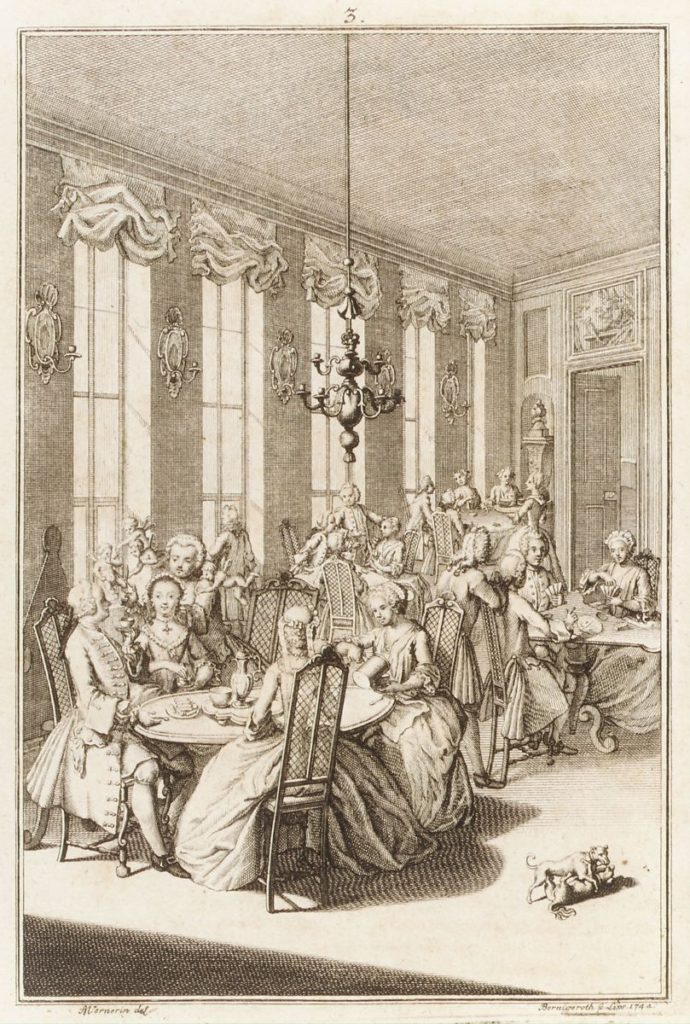
Wednesday
On Monday I hosted what proved to be a lovely luncheon (an onion tart, ratatouille, and a trifle) for Vanderbilt University Librarian Valerie Hotchkiss, who was in Sewanee to discuss a presentation I will be giving at the university on the card game Speculation. Jane Austen fans will recognize it as the game played in Mansfield Park. (You can read about it here.)
Valerie originally contacted me about my blog essay on ombre, the card game played in Alexander Pope’s Rape of the Lock. Vanderbilt’s library, already renowned for its archives on bridge, two years ago acquired “one of the world’s great gaming collections from the United States Playing Card Company.” According to a pamphlet describing Vanderbilt’s “distinctive collections,” Vanderbilt now owns “books and manuscripts from the fifteenth to the twentieth century, as well as archival records that document the development, design, and manufacture of playing cards.” Among the works is a fifteenth-century manuscript sermon “against the relatively new form of divination called Tarot in which, for the first time in history, the Tarot cards are named and explained.”
To draw attention to the collection, last year Valerie had a speaker first speak about and then teach the game of whist to an audience. The event proved so successful—people did not want to leave—that she contacted me to do the same with ombre, after which we decided on an evening devoted to Speculation as well. Since Speculation is much easier than ombre, even though Pope’s poetic handling of the latter is an unparalleled tour de force, we decided to do that one first.
While Speculation is so simple that Fanny Price masters the rules in three minutes, it’s a great revealer of character, showing the Bertrams, Crawfords and Prices for who they really are. Valerie and I discussed including some Austen role playing during the presentation where people would handle their cards as though they were Mary Crawford (reckless), William Price (ambitious), Fanny Price (self-sacrificing for her brother’s sake), Henry Crawford (manipulative), and Lady Bertram (very, very dumb).
As for ombre, I told Valerie that I have devised a set of simplified rules since it would be hard to master in a single sitting the game as people in Pope’s time played it. I’ve had success with this simplified version with my own classes and, once one knows how it’s played, one is dazzled by Pope’s use of it.
In honor of games of chance, I share today a Sir Walter Raleigh lyric on card and dice playing. It concludes with a riddle (which I failed to guess), and the poem as a whole makes remarkable parallels between games and Christianity:
On the Cards and Dice
Before the sixth day of the next new year,
Strange wonders in this kingdom shall appear:
Four kings shall be assembled in this isle,
Where they shall keep great tumult for awhile.
Many men then shall have an end of crosses,
And many likewise shall sustain great losses;
Many that now full joyful are and glad,
Shall at that time be sorrowful and sad;
Full many a Christian's heart shall quake for fear,
The dreadful sound of trump when he shall hear.
Dead bones shall then be tumbled up and down,
In every city and in every town.
By day or night this tumult shall not cease,
Until an herald shall proclaim a peace;
An herald strange, the like was never born,
Whose very beard is flesh and mouth is horn.
The sixth day of the new year would be the Epiphany, when divinity came to earth, but in this case the “strange wonders” are not the arrival of Christ the King but of four playing card kings. I assume “the great tumult,” “end of crosses,” and “great losses” refer to gambling losses, but the idea that those who now “full joyful are and glad,/ Shall at that time be sorrowful and sad” sounds also like Jesus’s “So the last shall be first, and the first last” (Matthew 20:16).
Furthermore, the “trump” that causes “many a Christian’s heart [to] quake for fear” could also be the trumpet sounded in the Book of Revelation. The “dead bones,” meanwhile, can function not only as dice—which were fashioned out of bone—but the dry bones that, in Ezekiel’s vision, will rise up and walk again once God breathes life into them.
The “herald strange,” in case you haven’t guessed, is a rooster, with its wattles resembling a beard. Roosters are sometimes associated with Christ’s resurrection, as in Henry Vaughan’s “Cock Crowing.” D. H. Lawrence also makes use of the symbol in his novella about Jesus, The Man Who Died, which was originally titled The Escaped Cock.
In short, Donne writes about people who gamble all night until the cock crows—or about a world that will experience much commotion until Christ’s resurrection and, after that, until Christ’s second coming. According to Vanderbilt’s 15th century manuscript, the hearts of those card players will indeed quake for fear when the final trump is played/sounded.

